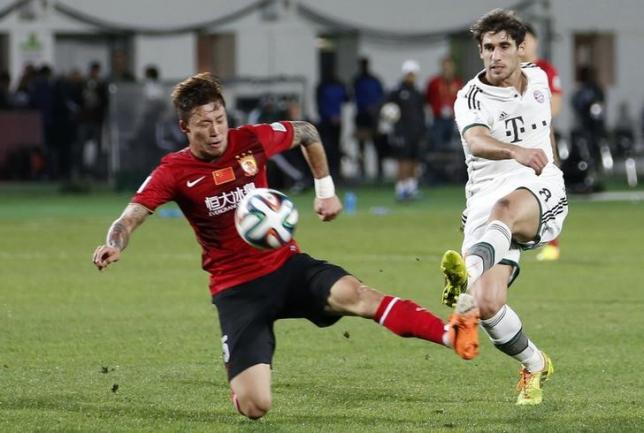Big spending Chinese clubs show global ambitions
SHANGHAI: The European transfer window is not so European any more, with Chinese clubs outspending the continent's richest clubs in January to prove that the country is now a genuine power in attracting the world's best players.
Chinese spending on soccer had been growing impressively in recent years, but has soared to unexpected heights at the start of 2016 with the domestic transfer record repeatedly broken.
The three biggest deals worldwide have all been made by Chinese clubs, eclipsing spending by European sides in their recent transfer window.
Jiangsu Suning made the biggest deal by signing Brazilian midfielder Alex Teixeira from Shakhtar Donetsk for $56 million on Friday, trumping the $47 million that Asian club champion Guangzhou Evergrande paid to Atletico Madrid to acquire Colombian striker Jackson Martinez last month.
Jiangsu also spent $31 million to sign midfielder Ramires from English champion Chelsea.
With the Chinese transfer window open until Feb. 26, there's mounting media speculation about which other players will soon join the exodus to the east.
Chinese president Xi Jinping is avowed fan of the game, which is growing in the world's most populous nation.
Guangzhou president Liu Yongzhou acknowledged the pressure this puts upon the club, and coach Luiz Felipe Scolari, to keep ahead of the chasing pack.
"We have been satisfied with the squad we have but even as champion of China and Asia, we are always looking to improve," Liu told The Associated Press. "The secret to being a good team is to continually strive for excellence. The Chinese Super League is getting stronger and it is important that we are always getting stronger too.
"We also have ambitions to keep succeeding in Asia."
Evergrande's ultimate target is to become one of the top clubs in the world. Financially, it's already getting there.
Chinese rivals such as Shanghai SIPG are desperate to wrest the domestic and even the Asian title away. Shanghai, the 2015 runner-up, is led by former England coach Sven-Goran Eriksson, who has compiled a $50 million strikeforce in Asamoah Gyan and Elkeson and has been chasing former Arsenal and Manchester United striker Robin Van Persie.
Guangzhou is backed by property developer Evergrande and Alibaba, one of the world's biggest e-commerce sites, while Shanghai is backed by Shanghai International Port Group.
Arsenal manager Arsene Wenger said he expects Chinese clubs to keep competing for players.
"China looks to have the financial power to move a whole league of Europe to China," said Wenger, who managed Grampus Eight in Japan before joining Arsenal in 1996. "It's just a consequence of economic power and they have that. Will they sustain their desire to do it?
"Let's remember, a few years ago, Japan started to do it and slowed down after. I don't know how deep the desire in China is, but if there's a very strong political desire we should worry."
Compared with recent years, more yuan is being spent by more and more teams, not just those at the top.
Hebei, backed by an industrial park development company, may be little known and newly promoted to the top tier but has signed Ivory Coast forward Gervinho from Italian club Roma for $20 million.
Jiangsu had regularly been a mid-table team but, since being taken over by a large retail group, has been linked with dozens of world famous players as it tries to spend a reported transfer fund of $200 million.
Shanghai Shenhua owned by a real estate company already had Tim Cahill but has signed Freddy Guarin from Inter Milan.
"When China invests it does so on an epic scale and in a way that overcomes all obstacles," said Simon Chadwick, a professor of Sports Enterprise at Salford University and a regular China commentator. "As such, there are strong reasons to believe that within 10 years, possibly even five, China will become a major player in world football."
The nation is also building at youth level to ensure the spending boom does not turn into a bust in the long term.
Tom Byer, a youth development expert, is employed as a consultant to the Chinese Ministry of Education as it rolls out a soccer program in schools.
"I don't think there is any other program similar throughout the world that is this big," Byer said. "The government is serious about development and also realizes grassroots development is not the glamorous side of the game and is often neglected by the media. This is a marathon, not a sprint."






